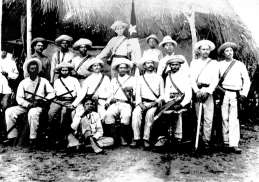Where did the word mambí that is used to denominate the insurgent come from that in Cuba fought heroically against the Spanish domination?
That same word, as a noun or as an adjective, was used by the authorities and other reactionary elements, at the time of the colony, as synonymous with something very bad: traitor, abominable, enemy, evil, son of bad guts …
There are many and varied versions of the origin of that word. The scholar Antonio Bachiller y Morales (1812-1889), in “Cuba Primitiva” considers that the voice comes from Santo Domingo, popularized during the revolution against Spain, and adds that in the indigenous language of Brazil it means “ear” and they called the beasts wild earns, maroons, with the word mambí.
Fernando Ortiz only says that the qualification of mambí applied to the Cuban insurgent against the Spanish domination.
Juan Luis Martín, in Cuban Papers, states that where only the mambí root could be found was in Africa and “it is the bad guy, the one who acts against the moral law, against the conventional”. And the demonstration is in the Bantu vocabularies, which come to confirm these conclusions. And he adds: “For us, mambí means bighorn.”
In the magazine “Vida Universitaria (March-April 1968), it is pointed out that the word mambí means in the lexicon congo dirty, repulsive, vicious, abominable, harmful, vile, cruel man.
The Spaniards began by qualifying the Dominican insurgents with that pejorative term, and then they assigned only those of Cuba. He adds: “Well, already from 1869, when founding Ignacio Mora and Pena in Guaimaro the newspaper El Mambí, they had awarded him a glorious interpretation and from 1876 to attribute it was even sanctifying”.
DE DONDE SURGIÓ LA PALABRA “MAMBÍ”?
De dónde surgió la palabra mambí que se emplea para denominar al insurrecto que en Cuba combatió heroicamente contra la dominación española?
Esa misma palabra, como sustantivo o como adjetivo, la utilizaban las autoridades y demás elementos reaccionarios, en la época de la colonia, como sinónimo de algo muy malo: traidor, abominable, enemigo, malvado, hijo de mala entraña…
Son muchas y muy variadas las versiones sobre el origen de ese vocablo. El erudito Antonio Bachiller y Morales (1812-1889), en “Cuba Primitiva” considera que la voz procede de Santo Domingo, popularizada durante la revolución contra España, y agrega que en lengua indígena de Brasil significa “oreja” y llamaban a las bestias orejanas salvajes, cimarronas, con la palabra mambí.
Fernando Ortiz solo dice que la calificación de mambí se aplicaba al insurgente cubano contra la dominación española.
Juan Luis Martín, en Papeles Cubanos, expresa que en donde únicamente podía encontrarse la raíz mambí era en África y “es el malo, el que actúa contra la ley moral, contra lo convencional”. Y la demostración está en los vocabularios bantúes, que vienen a confirmar estas conclusiones. Y agrega: “Para nosotros, mambí significa cimarrón”.
En la revista “Vida Universitaria (marzo-abril 1968), se señala que la voz mambí significa en el léxico congo hombre sucio, repulsivo, vicioso, abominable, dañino, vil, cruel.
Los españoles empezaron calificando con ese peyorativo término a los insurrectos dominicanos, y después asignaron solo a los de Cuba. Añade: “Pues bien, ya desde 1869, al fundar Ignacio Mora y Pena en Guáimaro el periódico El Mambí, le habían adjudicado una interpretación gloriosa y desde 1876 atribuírsela era hasta santificante”.
Agencies/Rad.Enciclopedia/Juan B. Rodríguez/Internet Photos/ Arnoldo Varona/ TheCubanhistory.com
THE CUBAN HISTORY, HOLLYWOOD.









